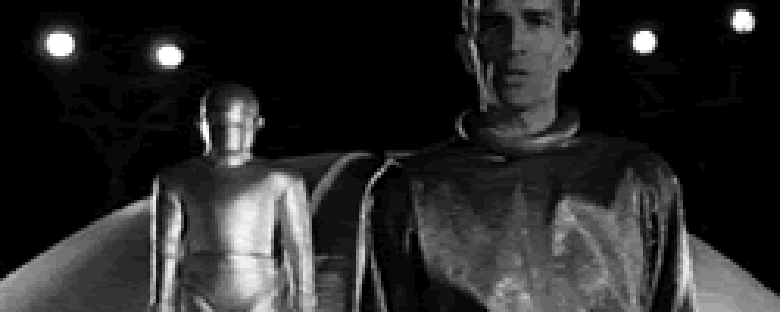Reviews
Robert Wise
USA, 1951
Credits
Review by Matt Bailey
Posted on 10 July 2004
Source Fox Studio Classics DVD
Klaatu, a visitor from another world, comes to Earth to warn its people against their current path of conflict resolution through violence. Upon exiting his spacecraft, Klaatu is shot immediately by a nervous soldier. Irony! Klaatu is taken to the hospital, where his wound heals mysteriously and instantly. The spaceman escapes the hospital and, posing as a man named Carpenter, takes up residence in a boarding house. While babysitting the little boy of one of his housemates, he tries to arrange a meeting of the top minds in the world so that he can spread his message of peace. As he waits for the meeting to come together, the anxiety his presence has caused in the world rises until people begin to demand that this “monster” be captured and killed. Klaatu eventually returns to his home planet via his flying saucer, but not before he gives the people of the world a right dressing down about their use of violence as a solution to all problems.
The Day the Earth Stood Still is one of the first of a whole slew of cautionary films made in the 1950s addressing the dangers of visitors from other planets. Some of these were more obvious than others in their attempts to act as parables about the spread of Communism, the danger of nuclear weapons, invasion by foreign forces, and other such concerns you’d like to think you could look back on and laugh about, even as you sit here reading this under Terror Alert Orange. I won’t make the obvious statement that everyone else makes about movies like this seeming more relevant than ever, but it’s worth taking another look at the message of this film because it’s not the message that everyone thinks it is.
Before Klaatu leaves for his home planet, he mentions that he (and, by extension, his planet) is part of a sort of intergalactic United Nations, the members of which have agreed to put their differences aside and not to use violence to solve their problems. How nice! What’s important to note, however, is that Klaatu doesn’t mention anything about the fact that these advanced planets and societies have actually resolved their differences, but instead states that they have created a supreme race of robot cops who have the power and authority to destroy entire worlds if the people of those worlds so much as threaten the use of violence against another world. In other words, it’s not that these advanced worlds are a bunch of peace-loving little green men; in fact, they are governments that have voluntarily subjugated their sovereignty to a fascist organization that threatens them with annihilation unless they remain on the up-and-up. Klaatu’s greatest hope for the people of Earth is that we can become enlightened enough to join his little group. No thanks. That’s not peace as a choice, that’s the kind of peace that’s kept by threats and intimidation — the kind of peace of people who would name a missile a Peacekeeper or a Patriot.
All that political stuff aside, though, this is a pretty good movie. Robert Wise’ direction, as usual, is assured and confident and never lets the story be bogged down in unnecessary details or subplot. The real standout of this film, however, is Bernard Herrmann’s score. For his scoring of this picture, Herrmann relied on his usual idiosyncratic orchestrations — in this case a pair of Theremins replacing the strings, tons of harps, a large brass section, and a number of other electric and electronic instruments rounding out the instrumentation. From the forceful opening notes of the title sequence, it’s clear that Herrmann meant to make a very modern sounding score. Herrmann’s wasn’t the first motion picture score that used the Theremin, but along with Miklos Rosza’s scores for Spellbound and The Lost Weekend, it is one of the best. Herrmann, in later years, would lament that his innovative use of the instrument had become a cliché in science fiction films, but imitation, as they say, is the sincerest form of flattery. Look how many horror films rip off Herrmann’s score for Psycho and you’ll see that sci-fi filmmakers were not the only ones to turn Herrmann’s great innovations into cliché.
Despite its problematic and confused political message, it’s a little sad that the story and tone of The Day the Earth Stood Still have not been as influential on sci-fi films as its score has. The film is very good at showing how effortlessly misunderstandings can develop between ordinary people and between nations and how easily fear can overwhelm reason and understanding. At the same time, it’s not overly optimistic regarding the nature of human beings and the quickness and ease to which they resort to baser instincts when faced with fear of the unknown.
We don’t do comments anymore, but you may contact us here or find us on Twitter or Facebook.



